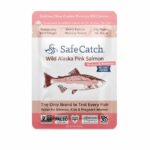Did you know that some of the worst foods to eat appear as if they are healthy choices? Part of the problem is market-speak labeling. Using words like ‘whole grains’ or ‘low fat’ is calculated to mislead you, the consumer. But even more insidious are the foods that contain large servings of pesticides, GMOs, and carcinogenic ingredients.
As a cancer survivor, it’s crucial for me to know what foods to most avoid. Luckily, organizations like the Environmental Working Group (ewg.org) and Prevention Magazine (prevention.com) watch out for our well being by monitoring the marketplace. Recently Prevention polled doctors and dietitians to reveal the foods they, personally, refuse to eat. Here are the top five, along with healthy, safer suggestions.
- Canned tomatoes: There are 50 micrograms of Bisphenol-A (BPA) in the resin lining of canned tomatoes (that’s a lot!). Studies of this synthetic estrogen show a link to reproductive problems, heart disease and more.
Healthier Alternative: Pomi brand chopped or strained tomatoes are packaged in a BPA-free box without preservatives, additives, water or citric acid and the tomatoes are never grown with pesticides or genetically modified seeds. - Sprouts: These seemingly innocuous little germinated seeds (pea, bean, etc.) are one of the most food-recalled products
 today, due to bacteria like salmonella, E. coli, and listeria.
today, due to bacteria like salmonella, E. coli, and listeria.
Healthier Alternative: Making your own sprouts, rather than buying from a large sprouting operation, is safer. But there is still a danger of bacteria. Follow these steps to ensure your homegrown product’s safety:
culturesforhealth.com/learn/sprouting/raw-sprout-safety-tips/ - Farmed salmon: Contamination is the culprit here as farmed
 salmon is found to contain carcinogenic chemicals such as PCBs (polychlorinated biphenyls), pesticides (such as dieldrin and toxaphene), and antibiotics.
salmon is found to contain carcinogenic chemicals such as PCBs (polychlorinated biphenyls), pesticides (such as dieldrin and toxaphene), and antibiotics.
Healthier Alternative: Your best bet is to splurge (it’s expensive) on wild Alaskan salmon. - Certain non-organic vegetables and fruits: The 2019 “dirty dozen’ according to the Environmental Working Group (EWG.org) are: apples, celery, cherries, grapes, kale, nectarines, peaches, pears, potatoes, spinach, strawberries and tomatoes.
Healthier Alternative: If this list contains some of your favorite fruits or veggies, then buy organic, which are generally grown without chemical fertilizers and pesticides. - Whole-wheat bread: Today’s commercial wheat was genetically
manipulated way back in the 60s and 70s and is thought to be one of the culprits behind many gut-related problems.
one of the culprits behind many gut-related problems.
Healthier Alternative: With sprouted grain bread, such as Food For Life’s Ezekiel bread, enzymes released during the sprouting process break down proteins and carbohydrates. This process helps make sprouted grain food low glycemic and easier to digest.
